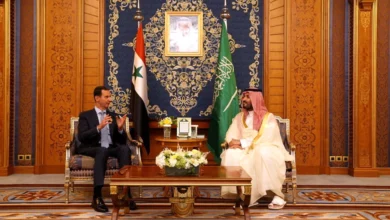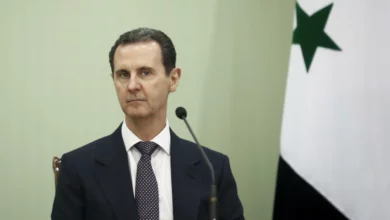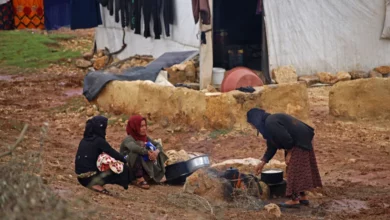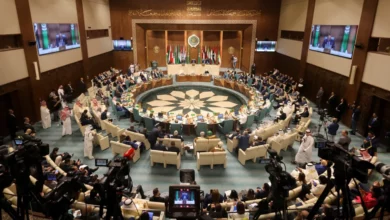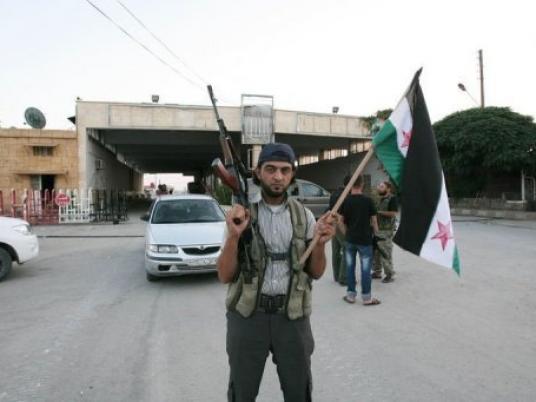
BEIRUT — With gunmen standing in the background, a Syrian rebel video purported Tuesday to show their latest captive: a lone Lebanese Shia suspected of links to pro-regime Hizbullah whose abduction appears part of a wider strategy shift to target perceived backers of Bashar Assad.
A series of hostage-takings aimed at Assad's few remaining supporters — Iranians and Lebanese Shia — has sought to both send a message about the rebels' reach and try to buff their image with seeming propaganda stunts such as captives praising their treatment and denouncing Assad's regime.
It also underscores the broader regional rifts exposed by Syria's civil war. Sunni powers such as Turkey and Saudi Arabia are strongly with the rebels, and Shia giant Iran and its proxy Hizbullah in Lebanon are standing by Assad, whose minority Alawi community is an offshoot of Shia Islam.
The abductions suggest the Syrian conflict is taking on increasing sectarian overtones as the country lurches deeper into crisis. The UN says an estimated 2.5 million Syrians have been injured, displaced or face problems securing food or other necessities, a sharp rise from about 1 million three months ago.
"There is an ongoing humanitarian crisis," said the UN humanitarian chief Valerie Amos after meetings in Damascus to try to open routes for more international aid into Syria. "It is important that the fighting stops."
In Amman, Jordan, the highest-ranking political defector from Assad's regime, former Prime Minister Riad Hijab, called for other top figures in the government and military to join the rebel side.
"The regime is on the verge of collapse morally and economically, in addition to cracks in the military," Hijab told a news conference in his first public remarks since fleeing to Jordan last week with his family under the protection of the Free Syrian Army.
He said he felt "pain in his soul" over the regime's shelling and other attacks on rebel strongholds as the government stepped up its military offensive. Activists say more than 20,000 people have been killed in the violence since March 2011.
"I was powerless to stop the injustice," Hijab said, speaking in front of the rebel flag. Hours later, the US lifted sanctions on Hijab that sought to freeze his assets.
"Syria is full of honorable officials and military leaders who are waiting for the chance to join the revolution," he said, claiming that Assad's forces only control 30 percent of Syria. "I urge the army to follow the example of Egypt's and Tunisia's armies — take the side of the people."
Hijab is a Sunni from the eastern province of Deir al-Zour, where rebels claimed to have shot down a regime MiG-23 warplane on Monday and captured the pilot. In the video claiming to show the captive pilot, a rebel insists that he would be treated according to the Geneva Convention — an apparent reply to international denunciations over recent execution-style killings of suspected regime supporters.
The authenticity of the video — or the veracity of the rebel claims of downing the warplane — could not be independently confirmed. Syria says the pilot ejected after a technical malfunction in the fighter jet.
The latest rebel video — broadcast on the Saudi-owned Al-Arabiya channel — claimed to show a Lebanese Shia who said he was among 1,500 Hizbullah fighters sent to Syria on 3 August to aid Assad's military. The authenticity of that video also could not be independently verified.
"Most of those who entered were snipers," said the captive, who identified himself as Hassane Salim al-Mikdad, and said his group was told by Hizbullah leader Sheikh Hassan Nasrallah to help "the Shia army against Sunni gangs." The captive appeared to have bruises on his face. Three masked gunmen stood behind him while a man off-camera asked questions.
The Syrian opposition has repeatedly accused Hezbollah of sending fighters to Syria, which the militant group denies. Hizbullah also said it "categorically denies" any links to al-Mikdad.
Abductions claimed by Syrian rebels have increased sharply as part of an apparent new tactic to rattle the regime and its core supporters outside the country.
In May, Syrian rebels captured 11 Lebanese Shias shortly after they crossed from Turkey on their way to Lebanon. Earlier this month, 48 Iranians were captured by Syrian rebels near Damascus. Rebels claim the Iranians include members of Tehran's Revolutionary Guard and were on a "reconnaissance mission" in the Syrian capital. Iran insists the men were on a religious pilgrimage.
The Lebanese are apparently being held to try to pressure the Beirut government to show greater support for the Syrian rebels — which is unlikely because of Hizbullah’s strong influence and backing of Assad.
On Monday, gunmen abducted the correspondent of Iran's state-run Arabic-language TV Al-Alam in the central city of Homs, his wife told The Associated Press. She said her husband, Ahmad Sattouf, was taken from his office and his whereabouts are unknown.
Sattouf is the third journalist to be abducted in Syria over the past three days. Three other journalists have been killed in Damascus and its suburbs since late last week.
Rebel videos have increasingly tried to portray the opposition fighters as generous to their captives — perhaps in hopes of spurring more military defections. It is impossible to assess whether comments from captives are forced or scripted, but in nearly all cases armed gunmen are visible.
A video circulated Tuesday purported to show several government soldiers captured in Deir al-Zour. A voice from off-camera asked: "How did the Free Syrian Army treat soldiers of Assad?"
"The best treatment," a soldier replied.
"Compare the treatment of Assad's soldiers toward the people with how the Free Syrian Army soldiers treat the people," the narrator said.
"There is no comparison," one soldier answered.
The clashes in Deir al-Zour are part of several fronts across Syria, including shelling and ground attacks by Syrian forces in attempts to push out rebel pockets in the largest city Aleppo. Just over the border in Turkey — which has raised ideas of a safe-haven zone inside Syria — troops held a one-hour drill with armored personnel carriers and missile launchers, according to Turkey's Anadolu Agency. It was the fourth such military maneuver this month.
At the UN, meanwhile, officials hope to revive a collapsed peace initiative.
A spokesman for outgoing UN peace envoy Kofi Annan said that Syria authorities have backed former Algerian Foreign Minister Lakhdar Brahimi as his successor. The spokesman, Ahmed Fawzi, said the next step was for Brahimi, a longtime UN official, to formally accept the post and resume efforts for a diplomatic solution to Syria's crisis.
In another possible sign of Syria's growing international isolation, the 57-nation Organization of Islamic Cooperation gathered in Saudi Arabia after preliminary calls to suspend Syria from the group. It would mostly be a symbolic blow against Syria since the group has little policy-making powers, but it would also be an embarrassing rebuff to Iranian President Mahmoud Ahmadinejad, who is attending the meeting as one of Assad's few allies.

